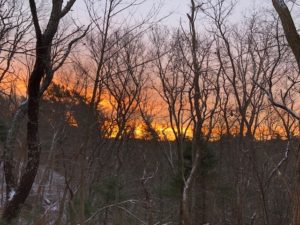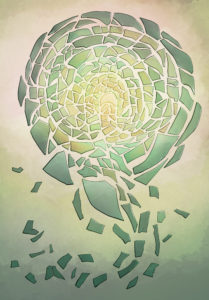Alone without beliefs

The fragmentation of 2020 is stunning.
On so many levels, the divides between us have never felt so wide, and so freshening. Some say rifts have been lying in waiting, disparities re-exposed by the pandemic and much more.
It seems to go even deeper than that as we hunker down for a dark winter with our partners, our tightening circles, our tribes. I wonder if you are experiencing anything like what I am.
There are steep drop-offs within families and splits among friends. Feuds between those following protocols to reduce risk from the novel coronavirus versus those mask-wearing and gathering-spreader deniers. Between reds and blues, anti-vaxxers, and segregated bubbles of information and trash.
Consider where you were a year ago: does life feel more fragile? Are you more grateful? Feeling more helpless?
True, on one hand, a very bright spot on the horizon is the expected rollouts of the vaccines that are showing strong initial results. Whether enough people will get over their mistrust to take them is another thing. And whether they will be distributed proportionately to those communities and populations hardest hit remains to be worked out.
How do we close the gap?
Amidst all this, I keep searching for unity, for inspiring common ground—and come up short. As much as I try to be a glass-is-half-full person, what I see most often is carelessness unraveling into decline.
I keep looking for hope from the outside—and realize it may only reside in my own beliefs, and by caring for the ones I love most.
I yearn for a bridge over gaping inequities, and growing fears. This has never felt so insurmountable.
Perhaps, just as empires must fall (and people far more astute than myself submit that is exactly what is occurring here), we need to break apart and fall away from one another in order to reform. To be made whole again.
I get some of that—having lived it. Our smashed pieces welded together into a new mosaic, or re-fired as pottery, can become stronger.
I believe in the reality of redemption.
Must we break apart to be made whole again?
Yet on the most personal, direct level, the disconnects and losses of this season and year cut extra deep. We have close friends striving to be responsible around Covid, staying isolated and taking other precautions so as not to infect a stranger, a neighbor, or an elderly loved one.
They have tried to do what was right—for themselves, and completely for others. Only to have that relative become infected, likely due to someone else’s lapse. Perhaps due to someone’s selfishness or denial.
I believe there will be a reckoning, when people must own up to their choices, creating other divides.
Careening into the holidays, you might expect we could cross some gaps as we wish others joy. At least be somewhat on the same page during a week when a third of all Americans lived within reach of hospitals running out of intensive care beds.
At the least, our leaders could do their jobs to protect citizens during a day when as many Americans died from Covid as those perished in the 9/11 attacks.
At the least, we could finally train our attention on solving massive needs—one of eight Americans going hungry—and the ongoing calamity of people out of work, or being evicted.
I believe time is running short to repair these things.
Instead, the fault lines have become more evident. While so many people’s lives are turned upside down.
Laid bare again are the divides of class and race. Between those who drive or take a bus or train each day to work showing up in person each day, versus those like me who are fortunate (and have the privilege) to largely work virtually, and sequestered.
I likely do not appreciate the experience of a nurse traveling into the city, the Stop ‘N Shop cashier, the plumber loading the van. We may thank the “essential workers,” those on the front lines, in posts and hearts taped on our homes. But how do we close the gap?
I have to believe it is possible to do so. If not, if we exist on islands of our extended or nontraditional families, on our phones and in social media vacuums, we are lost.
Also laid bare again are what Dr. Paul Farmer calls the “social pathologies of our nation come to fore” in a pandemic. Some of what Farmer means is how we have failed to invest in public health and making a care delivery system a priority. Our collective failure to make it accessible and equitable for all.
A recommendation: please take the five minutes to read or listen to Farmer’s recent interview on Democracy Now. If you don’t know, he is the world-renowned infectious disease doctor who started the nonprofit Partners in Health 33 years ago to deliver healthcare to people in Haiti. He’s worth a listen.
Also laid bare are staggering ironies—you might also call them hypocrisies—of this age.
For just one, anytime I hear people whining about their liberties being taken away, I want to ask (in an attempt to find common ground): did any of your grandparents or other relatives serve in World War II, or otherwise support the American effort to defeat fascism?
If so, what do you know about their sacrifice?
As this retrospective column details, that generation (not really so long ago, but many of us have not learned from them) made great sacrifices. Gathering scrap metal and rubber to recycle. Buying war bonds. Rationing, planting Victory gardens and turning off lights. Going without many things for three or so years. And of course, going to war.
I believe we can once again rally to a call like, “All hands on deck.”
So what is the resolution to these divides?
Perhaps it begins with taking ownership—surely, most of us have a part. Many times I use too broad a brush, a so-called progressive’s point of view. I don’t consider it as hubris, but I can be more open to others’ experiences as well as being self-critical in an ongoing dialectical exchange.
Maybe it’s time to cast those markers that separate us into the pit. Before we break apart some more.
And so you see, I have come to doubt
All that I once held as true
I stand alone without beliefs
The only truth I know is you
And as I watch the drops of rain
Weave their weary paths and die
I know that I am like the rain
There but for the grace of you go I.
— Simon and Garfunkel, “Kathy’s Song”

